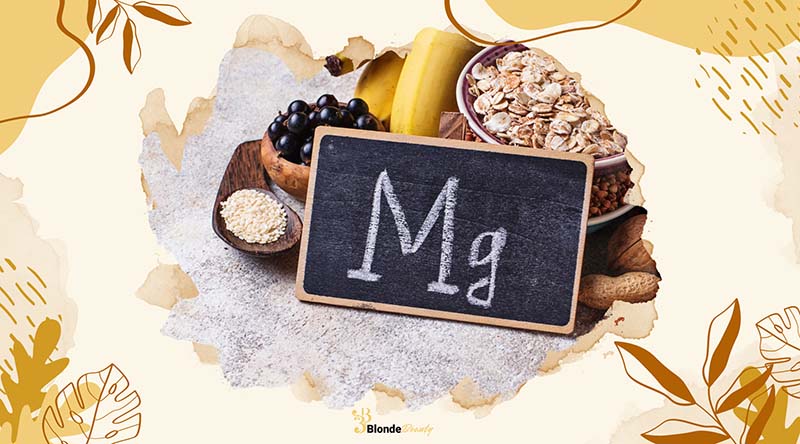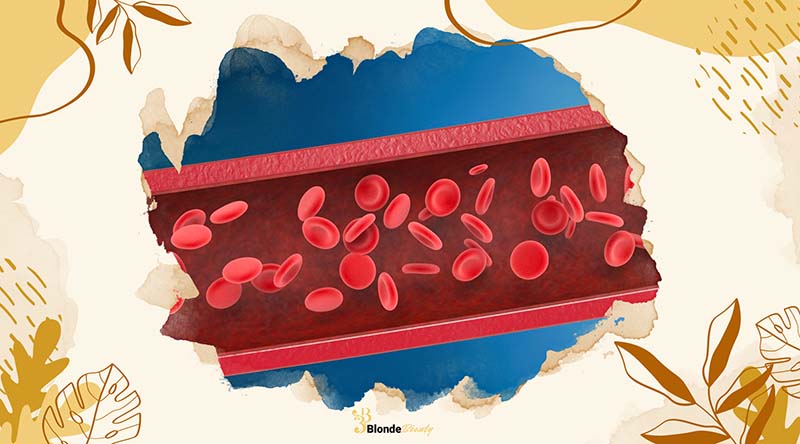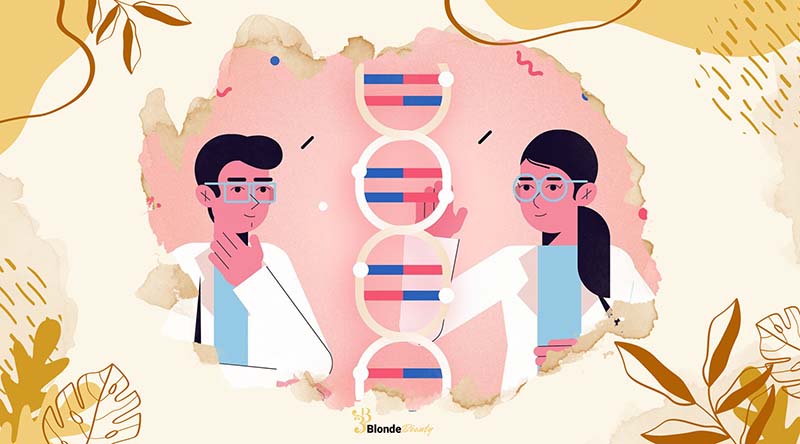Magnesium is a vital mineral that plays a crucial role in maintaining strong bones, a healthy heart, and stable blood pressure. It’s an essential nutrient that your body relies on for various functions.
Many people may wonder, “Is magnesium good for hair growth?” The answer is yes. In addition to its well-known health benefits, magnesium can contribute to hair growth and overall scalp health.
By incorporating magnesium into your daily regimen, you might find that it helps strengthen your hair, reduce hair loss, and promote a healthier scalp. This topic will explore how magnesium supports hair growth and why it’s an important nutrient for achieving vibrant, healthy hair.
Is Magnesium Good for Hair Growth?
Yes, indeed. Magnesium has a direct impact on hair growth. It regulates hair follicle production and the overall hair growth cycle, making it an essential mineral for healthy hair. When magnesium levels are low, hair follicles enter a resting phase and stop producing new hair, leading to hair loss.
Maintaining adequate magnesium levels helps keep hair follicles active and ensures continuous hair production. This means that by ensuring sufficient magnesium intake, you can support healthier hair growth and prevent hair loss.
Note: Maintaining proper magnesium levels can also help with reducing scalp inflammation, which further supports healthy hair growth.

Role of Magnesium in Hair Growth
Supports Healthy Hair Follicles
Hair follicles, the tiny structures in your skin, control hair growth. Healthy hair follicles are essential for hair volume. Magnesium plays a key role in the proper functioning of these hair follicles to ensure hair growth.
Low magnesium levels can hamper the functioning of hair follicles, leading to weaker and thinner hair.

Improves Blood Circulation
Magnesium helps blood vessels work well, which is crucial for good blood circulation and hair health.
With proper blood flow, essential nutrients and oxygen reach the hair follicles, creating a favorable environment for healthy hair growth.

Regulates Calcium Levels
Magnesium helps regulate calcium levels in the body, which is important for healthy hair growth. Excess calcium buildup in the hair follicles can lead to hair breakage and hair loss. Magnesium helps prevent this by ensuring calcium is properly managed.
Decreases Inflammation
Many scalp conditions involve inflammation around the hair follicles. Topical magnesium oil products may help reduce inflammation and improve these conditions.
If you suffer from female pattern baldness or thinning, also called androgenetic alopecia, reducing scalp inflammation is important, as it can contribute to hair loss.
Balances Hormones
Hormonal imbalances can contribute to hair loss. Magnesium helps maintain hormonal balance in your body, reducing the risk of hair-related issues by ensuring your hormones are in check.
Magnesium is key to boosting the health of hair follicles, which is crucial for hair growth. Ensure you maintain healthy levels of magnesium by including magnesium-rich foods in your diet to support strong, thick, and healthy hair.
Note: Foods rich in magnesium include leafy greens, nuts, seeds, and whole grains.

The Link Between Magnesium Deficiency and Hair Loss
Magnesium deficiency can cause hair loss in several ways:
Decreased Blood Flow: Magnesium is needed for proper blood circulation. When magnesium levels are low, blood flow to the scalp decreases. This means hair follicles don’t get the nutrients they need, leading to weaker hair and hair loss.
Weak Hair Follicles: Magnesium helps keep hair follicles anchored in the scalp by strengthening the keratin structures in the hair shaft. Low magnesium levels cause hair follicles to become loose, resulting in hair falling out more often.
Hormone Imbalance: Magnesium plays a role in balancing hormones. An imbalance of hormones such as testosterone and DHT (dihydrotestosterone) can lead to hair loss. Magnesium helps keep these hormones in check, reducing the risk of hair loss.
Magnesium deficiency can also cause alopecia, an autoimmune condition that leads to hair loss on the scalp, face, and body. This occurs when the immune system attacks the hair follicles. Hair follicles are particularly vulnerable when magnesium levels are low. Magnesium supplementation can help reduce the severity of alopecia and promote hair growth.
Note: Regularly including magnesium-rich foods in your diet or taking supplements can help prevent magnesium deficiency and its negative effects on hair health.
Which Form of Magnesium Is Beneficial for Addressing Hair Loss?
When choosing the right type of magnesium for hair loss, consider the following options:
Magnesium Citrate
Magnesium citrate is well-absorbed by the body and may support healthy hair follicles and promote hair growth by improving blood circulation.
Magnesium Glycinate
Magnesium glycinate is gentle on the digestive system. While direct research on its impact on hair growth is limited, its overall support for bodily functions may indirectly contribute to healthier hair.
Magnesium Threonate
Known for its ability to cross the blood-brain barrier, magnesium threonate is valuable for brain health. While not extensively studied for hair growth, its potential benefits for overall well-being could indirectly promote healthy hair.
Note: It’s always best to consult with a healthcare professional before starting any new supplement to ensure it’s appropriate for your specific needs and to determine the right dosage.
Enhancing Magnesium Intake for Healthy Hair
To improve your magnesium intake for healthier hair, consider the following tips:
Cut Down on Sugar: Reducing sugar intake can help improve your overall nutrition and magnesium absorption.
Avoid Pre-made and Pre-packaged Foods: These often contain fewer nutrients, including magnesium.
Engage in Stress-Reducing Activities: Stress can deplete your body’s magnesium levels, so activities like yoga, meditation, and exercise can help maintain them.
Consider a Magnesium Supplement: If dietary changes aren’t enough, supplements can help ensure you meet your magnesium needs.
Charles Passler, D.C., a celebrity nutritionist, emphasizes the importance of consuming magnesium-rich foods. He recommends eating green leafy vegetables daily. Other magnesium-rich foods include fresh fruit, fish, nuts, beans, whole grains, and even chocolate.
Here are some foods that are high in magnesium and can help promote healthy hair:
- Spinach: Spinach is a nutrient-dense leafy green vegetable high in magnesium, iron, and other vitamins and minerals essential for hair health.
- Almonds: Almonds are a good source of magnesium, protein, and healthy fats, which are important for promoting healthy hair growth.
- Avocado: Avocado is a nutrient-dense fruit high in magnesium, healthy fats, and other vitamins and minerals that are crucial for hair health.
- Salmon: Salmon is a fatty fish high in magnesium, omega-3 fatty acids, and other nutrients vital for promoting healthy hair growth.
- Pumpkin Seeds: Pumpkin seeds are a good source of magnesium, protein, and other vitamins and minerals that are important for hair health.
- Dark Chocolate: Dark chocolate is a good source of magnesium and antioxidants, which can help promote healthy hair growth.
- Black Beans: Black beans are a good source of magnesium, protein, and other nutrients essential for hair health.
Note: Incorporating these magnesium-rich foods into your daily diet, along with maintaining a balanced lifestyle, can significantly improve your hair health.
Potential Side Effects of Magnesium Supplementation
Magnesium supplements can cause side effects such as nausea, upset stomach, and diarrhea. Additionally, magnesium has a stool-softening effect.
Drug Interactions
Magnesium may not be safe for people taking certain medications, including diuretics, heart medications, or antibiotics.
Always inform your doctor if you are being treated for a medical condition or are taking any medications before starting magnesium supplements.
Overdose
Signs of a magnesium overdose include nausea, diarrhea, low blood pressure, muscle weakness, and fatigue. In severe cases, a magnesium overdose can be fatal. When taken by mouth, magnesium is relatively safe if taken at doses below 350 mg per day in healthy adults.
Effects on Other Conditions
People with certain medical conditions should avoid magnesium supplements unless specifically directed by their doctor. These conditions might include:
- Diabetes
- Intestinal disease
- Heart disease
- Kidney disease
Conclusion
In conclusion, magnesium is an essential nutrient that plays a vital role in promoting healthy hair growth. Ensuring that you get enough magnesium through your diet or supplementation can help promote healthy hair growth and reduce the risk of hair loss.
However, it’s important to choose the right type and dosage of magnesium supplement that works for your individual needs and health status. Incorporating other strategies, such as reducing stress, getting enough sleep, and addressing any underlying health conditions, can also help to boost magnesium levels and promote healthy hair growth.
This leads us back to the question, “Is magnesium good for hair growth?” Clearly, the answer is yes, as magnesium is crucial for maintaining healthy hair and preventing hair loss.
Don’t forget to check out more blogs from Blonde Beauty for additional tips and insights on achieving your best hair ever.

Laureate Professor Clare Collins
Professor Clare Collins is a leading expert in nutrition and dietetics at the School of Health Sciences, part of the College of Health, Medicine and Wellbeing. Her work is changing the way we think about food and health. She grew up as one of nine children and was the first in her family to finish high school and go to college. This background gave her a strong work ethic and a deep appreciation for seizing opportunities.
As the Director of the Hunter Medical Research Institute’s Food and Nutrition Program and a recipient of three NHMRC Research Fellowships, Professor Collins is making a big difference in public health. She focuses on helping people who are often overlooked, using new technologies like apps and online programs to improve their nutrition and reduce the risk of chronic diseases.
Professor Collins is well-respected and has been recognized as a Fellow in four major health and science organizations. She leads a diverse team of experts, including dietitians, computer scientists, and engineers, working together on global health projects.
Her achievements are impressive. She has received over $29 million in research funding, published more than 450 papers, and helped 35 PhD and Master’s students complete their degrees. She’s also active in sharing her knowledge with the public. She has developed tools like the Australian Eating Survey and the Healthy Eating Quiz, and she often appears in the media to talk about nutrition.
PUBLISHED ARTICLES
- Collins, C. (2019). “The Effect of a Pilot Dietary Intervention on Pain Outcomes in Patients Attending a Tertiary Pain Service.”
- Collins, C. (2022). “Variation in cardiovascular disease risk factors among older adults.”
- Collins, C. (2022). “Evaluation of an online intervention for improving stroke survivors’ health-related quality of life: A randomised controlled trial.”
These articles show Professor Collins’s commitment to understanding how better nutrition can improve health. Her work is important for researchers, doctors, and anyone interested in healthy living.
